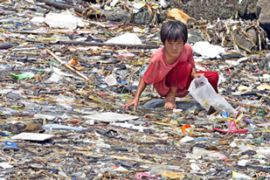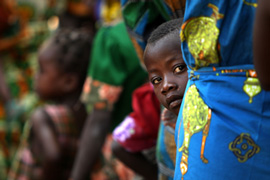Africa ‘faces increased poverty’
Global economic crisis risks pushing millions of Africans into poverty, IMF head says.

“It is about people and their futures.”
The IMF expects global growth to fall below zero this year – the worst performance in many years, Strauss-Kahn said.
“Even though the crisis has been slow in reaching Africa’s shores, we all know that it’s coming and its impact will be severe,” he said.
Finance ‘gap’
Jakayo Kikwete, the president of Tanzania, told those gathered in Dar es Salaam that the economic gains made across the continent in recent years are now under threat due to the global slowdown.
“There are growing worries about the potential effects of the global financial meltdown, coming so soon after the food and oil crisis,” he said.
“Only a few years ago the prospects for sub-Saharan Africa seemed so bright; for the first time in two decades the region was growing at the same rate as the rest of the developing world, except China and India.”
The IMF’s assessment comes a day after the World Bank said that developing countries face a financing gap of $270bn to $700bn this year as trade income dwindles and rich nations vie for capital to deal with the global economic slowdown.
Resources of international financial institutions will not be sufficient to meet their needs as more and more emerging and developing countries are hit, the organisation said on Monday.
| In video |
|
|
“Should a more pessimistic outcome occur, unmet financing needs will be enormous,” a World Bank paper prepared for meetings of the G20 group of countries in London in April said.
Last week, the IMF said developing countries would need $25bn, and possibly as much as $140bn, in 2009 to meet their financing needs.
At the same time, remittances from overseas workers are slowing and falling commodity prices have sapped a revenue source that many countries rely on.
The likely sharp drop in remittances will affect the incomes of poor families as unemployment rises and more migrant workers lose jobs in Europe and the US.
Remittance flows are estimated to have reached $305bn in 2008, up nine per cent from 2007.
World Bank projections suggest remittances to developing countries will fall in 2009, with Africa, Eastern Europe and Central Asia hardest hit.
Equity flows
In its report, the World Bank estimated that in 2009, 104 of 129 developing countries will have current account surpluses smaller than private debt.
For these countries, total financing needs were expected to amount to more than $1.4 trillion during the year.
 |
| Falling growth will impact families living just above the poverty line in poorer nations [AFP] |
Financial demands on international donors are expected to exceed private sources of financing (equity flows and private debt disbursements) in 98 of the 104 countries, implying a financing gap in those 98 countries of about $268bn.
Should rollover rates, or loan renewals, come in lower than expected, or capital flight significantly increase, this figure could rise to almost $700bn, the World Bank said.
It said the situation could become as severe in poorer countries where falling growth will impact families living just above the poverty line, who are particularly vulnerable.
Aly Khan Satchu, a Nairobi-based financial analyst, told Al Jazeera that the World Bank report was a “wake-up call” to the developing world.
“I think the World Bank is actually just signalling how bad it is and signalling that it is the more fragile countries, the developing world, the emerging world that has to get together and make its case before the coffers are plundered,” he said.
“Wherever you turn you can see the level of unrest spiking up and one wonders whether our policymakers have the understanding to deal with the situation.”
Many of the worst affected countries are heavily reliant on aid which could be cut as rich nations cope with budget pressures of their own.
“There is therefore a strong need to expand assistance to [lower income countries] to protect critical expenditures and prevent an erosion of progress in reducing poverty,” the World Bank said.

